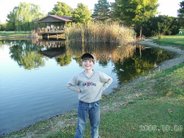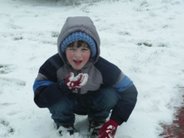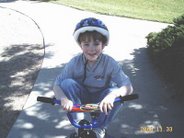Autism study finds father's age a factor
No similar effect seen with mother
By Thomas H. Maugh II, Los Angeles Times | September 5, 2006
LOS ANGELES -- Men over 40 are nearly six times as likely to father an autistic child as those under the age of 30, according to a new study that provides support for the role of genetics in the development of the disabling mental disorder.
At least two previous small studies have hinted at such a link, said epidemiologist Abraham Reichenberg of the Mount Sinai School of Medicine in New York, who led the new study.
His team examined records of more than 318,000 Israelis born in the 1980s and provides ``the first convincing evidence" that advancing paternal age is an important risk factor for development of the disorder, he said.
In a surprising discovery, the team also found that the gender ratio of the afflicted changes as the father ages. Typically, about six times as many boys as girls develop the disorder. When the fathers are over 40, however, the ratio is 1 to 1.
``That might suggest that there are different mechanisms contributing to autism in males than in females, or that the mechanism changes for older fathers," Reichenberg said.
Like earlier studies, the new one, reported yesterday in the Archives of General Psychiatry, found no significant effect associated with increasing maternal age.
Autism is a severe developmental disorder in which children seem isolated from the world around them. There is a broad spectrum of symptoms, marked by poor language skills and an inability to handle social relations. No cure exists, but many problems can be alleviated with intensive behavioral therapy.
A recent government study found that the disorder now strikes about 1 in every 175 children, up substantially from the incidence of about 1 in 1,000 observed two decades ago. Although some of the increase is due to better diagnosis of autism, researchers are at a loss to explain the bulk of the increase.
Many researchers now believe that genetics plays a role in the onset of autism, said Dr. Fred Volkmar of Yale University, who was not involved in the study. So far, however, it has not been possible to implicate specific genes. Reichenberg's results could provide useful clues, he noted.
A growing number of congenital disorders have already been linked to older fathers, including Apert syndrome, syndactyly, cleft lip, and decreased intellectual capacity. Reichenberg's group also recently identified a higher risk of schizophrenia among offspring of older men.
The team studied all children born in Israel during six consecutive years in the 1980s. They linked birth records to those of the Israeli draft board, which assesses mental and physical health of most Israelis at age 17. The primary exception is orthodox Jewish women -- about 25 percent of the Israeli total -- who are exempt from the draft.
The data contained the ages of the mother and father at the time of conception for 132,271 teens and data on only the father's age for an additional 186,235. Similar results were found with both groups.
Those whose fathers were between ages 30 and 39 at birth were 64 percent more likely to be autistic than those whose fathers were 29 or younger.
Those whose fathers were 40 to 49 were 5.65 times as likely to be autistic.
Those whose fathers were over the age of 50 were 9.39 times as likely to be autistic, but that figure was not statistically significant because there was only one case of autism among the 190 teens.
The team considered several possible explanations for the findings, including spontaneous mutations in sperm-producing cells and alterations in genetic ``imprinting," which controls the genes that are activated during development.
Reichenberg said the team is now beginning trials to look for such gene changes in older men and their offspring.
They are also replicating the study in other populations. He did not expect to find different results, however, because a recent Israeli study showed that the incidence of autism in that country is the same as in the United States.
Subscribe to:
Post Comments (Atom)


























 This website is part of the autism-assembly, this is a coalition of
members of the autistic community who share the common goal of seeking
acceptance for those on the autistic spectrum, who aim to educate about
autism, and who are not seeking a cure for autism. This is part of the
global autism rights movement.
This website is part of the autism-assembly, this is a coalition of
members of the autistic community who share the common goal of seeking
acceptance for those on the autistic spectrum, who aim to educate about
autism, and who are not seeking a cure for autism. This is part of the
global autism rights movement.



1 comment:
You might be interested in my paper dealing with sporadic, de novo autism. http://ebdblog.com/paternalage/
best wishes,
Leslie
Post a Comment